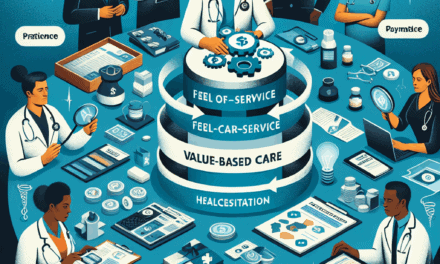Survey Reveals Delayed Health Insurance Choices Linked to Trump Administration Concerns
The landscape of health insurance in the United States has undergone significant changes over the past decade, particularly during the Trump administration. A recent survey has shed light on how concerns related to this administration have influenced individuals’ decisions regarding health insurance. This article delves into the findings of the survey, exploring the implications of delayed health insurance choices, the factors contributing to these delays, and the broader context of health care policy during and after the Trump era.
Understanding the Survey: Methodology and Key Findings
The survey conducted by the Health Insurance Research Institute (HIRI) aimed to assess the impact of political climate on health insurance choices. It involved a diverse sample of over 5,000 respondents across various demographics, including age, income, and geographic location. The survey was designed to capture not only the choices individuals made regarding health insurance but also their motivations and concerns.
Key findings from the survey revealed that:
- Approximately 30% of respondents reported delaying their health insurance decisions due to uncertainty surrounding policy changes during the Trump administration.
- Among those who delayed, 45% cited concerns about potential loss of coverage under the Affordable Care Act (ACA).
- Individuals with lower incomes were more likely to express anxiety about their health insurance options, with 50% indicating they felt overwhelmed by the choices available.
- Young adults aged 18-34 were particularly affected, with 40% reporting they postponed enrollment in health insurance plans.
- Overall, 25% of respondents indicated they were unaware of their options, highlighting a significant gap in health literacy.
These findings underscore the complex interplay between political factors and personal health care decisions, revealing a landscape fraught with uncertainty and anxiety.
The Impact of Political Climate on Health Insurance Choices
The political climate in the United States has a profound impact on health care policy and individual choices. During the Trump administration, numerous attempts were made to repeal and replace the ACA, leading to widespread uncertainty among consumers. This uncertainty has been linked to delayed health insurance choices, as individuals grappled with the potential consequences of policy changes.
One of the most significant factors contributing to this delay was the constant media coverage surrounding health care reform. News reports often highlighted the potential for millions to lose coverage, which created a sense of urgency and fear among consumers. For instance, a study by the Kaiser Family Foundation found that 60% of Americans were concerned about losing their health insurance due to changes in policy.
Moreover, the Trump administration’s focus on deregulation and market-driven solutions led to confusion about the future of public health programs. Many individuals were unsure whether they would still have access to essential services, such as preventive care and mental health support. This uncertainty was particularly pronounced among vulnerable populations, including low-income families and individuals with pre-existing conditions.
As a result, many individuals chose to delay their health insurance decisions, hoping for clarity in the political landscape. This delay often resulted in individuals remaining uninsured or underinsured, which can have dire consequences for their health and financial stability.
Case Studies: Real-Life Implications of Delayed Health Insurance Choices
To illustrate the real-life implications of delayed health insurance choices, consider the following case studies that highlight the experiences of individuals who faced challenges during the Trump administration.
**Case Study 1: Sarah, a 28-Year-Old Freelance Graphic Designer**
Sarah, a freelance graphic designer, found herself without health insurance after graduating from college. Initially, she was eligible for coverage under her parents’ plan, but as she turned 26, she had to seek her own insurance. The uncertainty surrounding the ACA during the Trump administration made her hesitant to enroll in a plan. She feared that if the ACA were repealed, she would lose access to essential services.
Despite her need for coverage, Sarah delayed her decision for over a year. During this time, she faced several health issues, including a severe respiratory infection that required hospitalization. The lack of insurance left her with significant medical debt, which could have been avoided had she enrolled in a plan earlier.
**Case Study 2: John and Maria, a Low-Income Couple**
John and Maria, a couple in their early 30s with two children, struggled to navigate the health insurance landscape. With limited income, they were eligible for Medicaid but were unsure about the application process. The constant changes in health care policy under the Trump administration created confusion about their eligibility and the benefits available to them.
As a result, they delayed applying for Medicaid for several months, during which time their children experienced health issues that went untreated. Once they finally enrolled, they found that their children had developed complications that could have been prevented with timely medical care.
These case studies highlight the tangible consequences of delayed health insurance choices, emphasizing the need for clear communication and support for individuals navigating the complex health care system.
Barriers to Health Insurance Enrollment: A Closer Look
Several barriers contribute to the delays in health insurance enrollment, particularly during politically tumultuous times. Understanding these barriers is crucial for developing effective strategies to improve access to health care.
**1. Lack of Information**
Many individuals reported feeling overwhelmed by the sheer volume of information available regarding health insurance options. The complexity of plans, varying coverage levels, and differing costs can be daunting. The survey indicated that 25% of respondents were unaware of their options, highlighting a significant gap in health literacy.
**2. Fear of Change**
The fear of losing existing coverage or facing higher costs can deter individuals from making timely decisions. The Trump administration’s rhetoric around health care reform exacerbated these fears, leading many to postpone their enrollment.
**3. Economic Factors**
Economic instability, particularly during the COVID-19 pandemic, has made individuals more cautious about financial commitments. Many respondents cited concerns about affording premiums and out-of-pocket costs as reasons for delaying their decisions.
**4. Administrative Barriers**
Complicated application processes and bureaucratic hurdles can also impede timely enrollment. Individuals may struggle to gather necessary documentation or navigate online platforms, leading to frustration and delays.
**5. Social Determinants of Health**
Social determinants, such as education, income, and access to technology, play a significant role in health insurance enrollment. Individuals from marginalized communities often face additional challenges, including language barriers and limited access to reliable information sources.
Addressing these barriers requires a multifaceted approach that includes improving health literacy, simplifying enrollment processes, and providing targeted support for vulnerable populations.
The Future of Health Insurance Choices Post-Trump Administration
As the Biden administration takes steps to stabilize the health insurance market, it is essential to consider how these changes will impact individuals’ choices moving forward. The administration has made efforts to expand access to health care through various initiatives, including increasing funding for outreach and enrollment efforts.
**1. Strengthening the Affordable Care Act**
The Biden administration has focused on strengthening the ACA, making it more accessible and affordable for individuals. This includes increasing subsidies for low- and middle-income families, which can alleviate some of the financial burdens associated with health insurance enrollment.
**2. Expanding Medicaid**
Several states have expanded Medicaid under the ACA, providing coverage to millions of low-income individuals. Continued efforts to expand Medicaid in states that have yet to do so could significantly improve access to health care for vulnerable populations.
**3. Enhancing Outreach and Education**
Improving outreach and education efforts is crucial for increasing health literacy and ensuring individuals are aware of their options. The administration has allocated funding for community-based organizations to provide assistance with enrollment and education about available plans.
**4. Addressing Social Determinants of Health**
Recognizing the impact of social determinants on health outcomes, the administration is working to address these factors through various initiatives. This includes investing in community health programs and improving access to technology for underserved populations.
**5. Fostering a Collaborative Approach**
Collaboration between federal and state governments, as well as private organizations, is essential for creating a more cohesive health care system. By working together, stakeholders can develop innovative solutions to improve access and affordability for all individuals.
Conclusion: Key Takeaways and the Path Forward
The survey revealing delayed health insurance choices linked to concerns during the Trump administration highlights the intricate relationship between political factors and personal health care decisions. As individuals navigated a landscape fraught with uncertainty, many chose to delay their enrollment, leading to significant consequences for their health and financial stability.
Key takeaways from this analysis include:
- The political climate significantly influences health insurance choices, with uncertainty leading to delays in enrollment.
- Real-life case studies illustrate the tangible consequences of delayed health insurance decisions, emphasizing the need for timely access to care.
- Barriers to enrollment, including lack of information and economic factors, must be addressed to improve access to health care.
- The Biden administration’s efforts to strengthen the ACA and expand Medicaid represent a positive shift toward improving health insurance access.
- A collaborative approach involving various stakeholders is essential for creating a more equitable health care system.
As the United States moves forward, it is crucial to prioritize clear communication, education, and support for individuals navigating the health insurance landscape. By addressing the barriers that contribute to delayed choices, we can work toward a more inclusive and accessible health care system for all.





